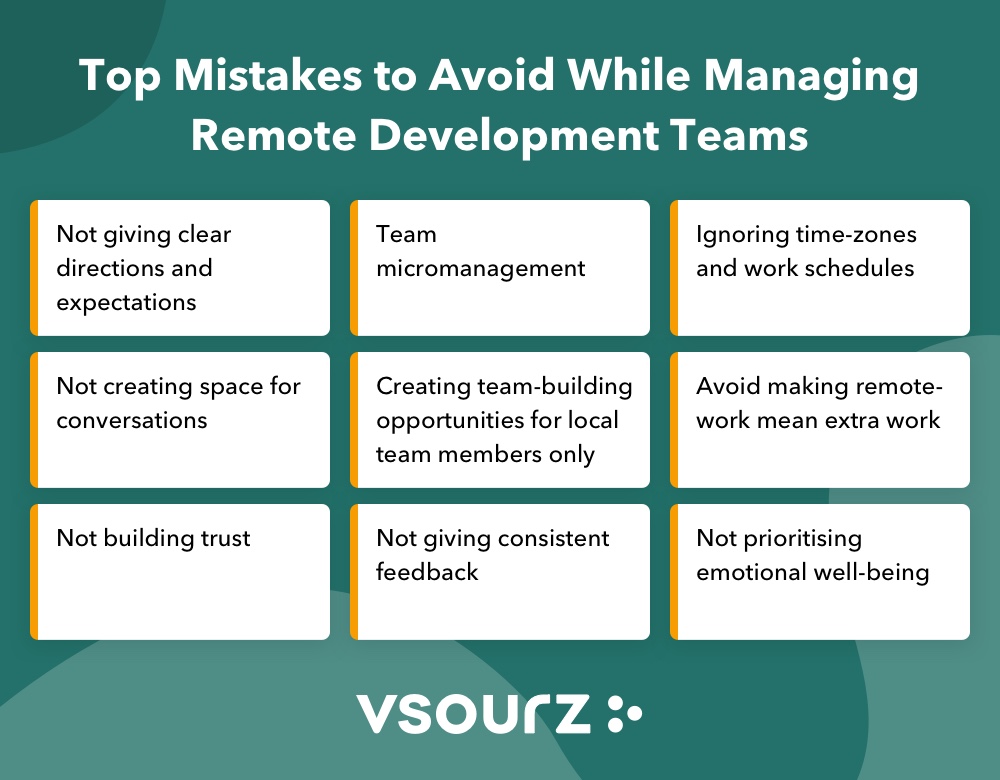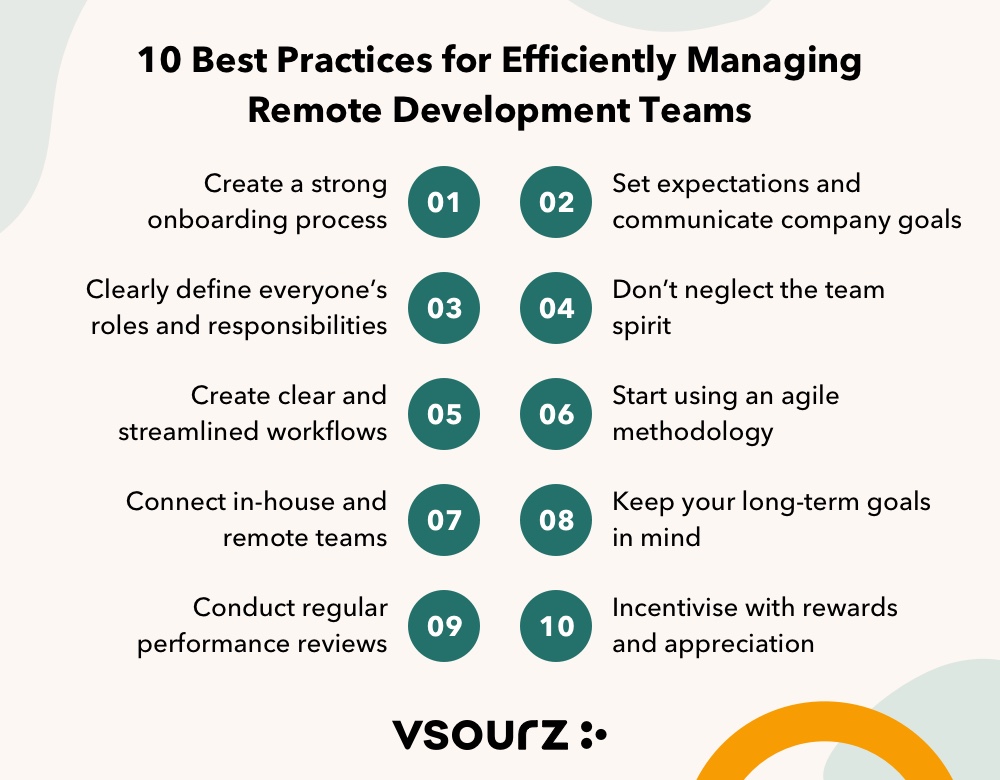The Art of Managing Remote Teams: Best Practices

But managing a remote development team effectively requires a different set of skills and strategies compared to managing an in-house team. In this guide, we will dive into the art of managing remote teams, which extends from understanding the benefits to implementing best practices for success. Whether you are considering working with a dedicated development company or you want to learn how to build your own remote dedicated software development teams, these tips and techniques will help you navigate the challenges and make the most out of your remote team.
This blog will cover managing remote teams best practices, including:
- What Is a Remote Development Team?
- Top Mistakes to Avoid While Managing Remote Development Teams
- 10 Best Practices for Managing a Remote Development Team Effectively
- 5 Tips on How to Hire Remote Development Team Members
- What are the Best Tools for Managing a Remote Development Team Effectively?
- Hire a Remote Team from a Dedicated Development Company
What Is a Remote Development Team?
What Is a Remote Development Team?
A remote development team is a group of individuals who work together on a project from different locations. They leverage technology, such as communication and collaboration tools, to work together despite being physically apart. This not only allows companies to tap into a global pool of talent but also offers flexibility for employees to work from anywhere.
During the global pandemic, we saw that remote work is not only feasible but also highly efficient. It has become the norm for many companies, and even after the pandemic, remote work has continued to be a popular option. As a result, it’s essential to understand and implement best practices for effectively managing remote development teams. Thankfully, there is plenty of knowledge and resources available to help you succeed.
Top Mistakes to Avoid While Managing Remote Development Teams
Top Mistakes to Avoid While Managing Remote Development Teams
Managing remote development teams comes with its own set of challenges. It requires a different approach compared to managing an in-house team. Often, managers fail to recognise the unique aspects of managing a remote team, which can lead to mistakes and ultimately affect team productivity. Micromanagement, lack of communication, and poor team-building are some of the most common complaints from remote employees. If you want to know what to avoid while managing remote development teams, here are some top mistakes to keep in mind:
Not giving clear directions and expectations
One of the most significant challenges for remote teams is not having face-to-face communication. This can result in miscommunication or unclear expectations, leading to delays and mistakes. It’s crucial to provide clear directions and set expectations from the beginning to avoid any confusion. Don’t presume that your remote team knows what to do – take the time to communicate effectively.
Team micromanagement
Some managers fear that with remote work, they won’t be able to monitor their team’s productivity. As a result, they resort to micromanagement, which can be counterproductive. Micromanaging your remote team can lead to demotivation and a lack of trust. Instead, focus on setting clear goals and trusting your team to deliver.
Ignoring time-zones and work schedules
When managing remote development teams, some managers forget to take into consideration the different time zones and work schedules. Not taking these factors into account can lead to employees feeling burnt out or unable to balance their personal and professional lives. Be aware of everyone’s availability and try to accommodate different schedules as much as possible.
Not creating space for conversations
When it comes to in-person office work, conversations often occur organically. But this isn’t the case for remote teams. Without a designated time and space for discussions, important conversations can be missed or delayed. Make sure to create opportunities for team members to communicate and share ideas regularly.
Creating team-building opportunities for local team members only
This is often a sore point for remote workers who work alongside in-person teams. It’s important to ensure that all team members, regardless of their location, feel included and involved. Plan team-building activities and events that can include everyone, even if they are not physically present in the same location.
Avoid making remote-work mean extra work
Sometimes, managers may have a misconception that remote workers have more time to work since they are not physically present in an office. This can lead to assigning extra tasks or expecting them to be available at all times. It’s important to remember that remote workers also have set work hours and should not be expected to work beyond them.
Not building trust
Trust and rapport are essential for any team to function effectively. However, it can be difficult to establish this when working remotely. As a manager, make an effort to build relationships with your remote team members through regular communication and getting to know them personally.
Not giving consistent feedback
Feedback is crucial for employee growth and development. But with remote teams, it can be easy to overlook this important aspect. Be sure to provide consistent and timely feedback to your remote team members, just as you would with in-person teams.
Not prioritising emotional well-being
If you can’t see your team face-to-face on a regular basis, it can be easy to miss signs of stress or burnout. Make sure you check in with your remote team members regularly and provide them with resources and support for their emotional well-being. This could include mental health initiatives, flexible work hours, and encouraging breaks throughout the day.
10 Best Practices for Efficiently Managing Remote Development Teams
10 Best Practices for Efficiently Managing Remote Development Teams
There are many different management styles when it comes to remote teams, but behind every successful remote development team is a set of best practices that management should strive to follow. These best practices can help overcome common challenges and keep your team running smoothly. Here are 10 best practices for managing a remote development team effectively:
1. Create a strong onboarding process
The first few weeks are often the most crucial for new employees, and when it comes to remote teams, a good onboarding process is even more important. Make sure you provide new team members with all the necessary information and resources they need to get started, including access to tools and training materials. They won’t be able to lean over to another team member’s desk and ask them for help, so it’s important to set them up for success from the beginning.
2. Set expectations and communicate company goals
Remote team members should feel connected to the organisation’s goals just like in-house employees. Clearly communicate your company’s mission and vision, as well as individual and team goals, to keep everyone aligned and motivated. It’s also important to set expectations for performance, communication, and availability so that everyone knows what is expected of them.
3. Clearly define everyone’s roles and responsibilities
In traditional office settings, team members can easily see who is working on what and when. But with remote teams, it’s not always easy to keep track of who is responsible for which task. Clearly define roles and responsibilities within the team and hold everyone accountable for their work. This will help prevent confusion or duplication of efforts. Generally, every development project should have a clearly defined:
- UX/UI Designer
- Quality Engineer
- Developer
- Product Owner
- DevOps Engineers
- Scrum Master
4. Don’t neglect the team spirit
Remote teams may lack the in-person interactions that can help build team spirit and camaraderie. As a manager, it’s important to actively develop a sense of community and encourage teamwork. This can be achieved through team-building activities, virtual happy hours, or even just regular check-ins to see how everyone is doing.
5. Create clear and streamlined workflows
Remote teams may face challenges in coordinating their work and staying on track. To combat this, it’s important to establish clear workflows and processes that everyone can follow. This will help streamline the development process and make sure that tasks are completed efficiently.
6. Start using an agile methodology
Agile methodology focuses on iterative and collaborative development, making it well-suited for remote teams. Embrace agile principles like regular sprint planning, daily stand-ups, and retrospectives to keep the team aligned and focused on delivering high-quality work.
7. Connect in-house and remote teams
It’s easy to fall into the trap of separating in-house and remote teams, but it’s important to sync between them regularly. This means making sure that everyone is aligned on project goals, tasks, and timelines. Regular communication and updates can bridge the gap and ensure that both teams are working towards the same objectives.
8. Keep your long-term goals in mind
Whatever it is you’re building, it’s important to keep long-term goals in mind. This means not only focusing on the immediate tasks at hand but also looking ahead and planning for future development. If you’re using a dedicated development team, this can help to provide continuity and consistency throughout the project.
9. Conduct regular performance reviews
Just like in a traditional office setting, remote teams also benefit from regular performance reviews. This allows for open and honest communication about expectations, progress, and areas for improvement. It’s especially important to provide constructive feedback to remote team members since they lack the everyday in-person feedback that in-house staff receive.
10. Incentivise with rewards and appreciation
Remote teams can often feel isolated and out of touch with the company culture. It’s important to make an extra effort in recognising their contributions and showing appreciation for their hard work. This could mean sending personalised thank-you notes or small gifts, organising virtual team-building activities, or providing opportunities for career growth and development within your organisation.
5 Tips on How to Hire Remote Development Team Members
5 Tips on How to Hire Remote Development Team Members
It will make your life significantly easier as a remote development team manager if you can hire the right staff from the start. Here are five tips to help you build your remote team with the best members:
1. Evaluate skills and experience
When hiring remote team members, it’s essential to carefully evaluate their skills and experience. This can be more challenging to do without the traditional in-person interview process, but there are other ways to assess their capabilities, such as through technical assignments, portfolio reviews, or video interviews.
2. Check references
Don’t overlook the importance of checking references and recommendations for potential remote team members. These can provide valuable insights into their work ethic, communication style, and ability to work in a remote environment.
3. Assess cultural fit
Beyond skills and experience, it’s crucial to assess whether a potential remote team member will be a good cultural fit for your organisation. This includes considering their work values, communication style, and ability to adapt to your company’s culture.
4. Check communication skills
Effective communication is essential for managing remote development teams successfully. During the hiring process, pay attention to a candidate’s communication skills, including written and verbal proficiency, since this will affect their ability to collaborate with team members remotely.
5. Keep a growth mindset
Hiring the right remote team members is an ongoing process, so it’s essential to have a growth mindset. This means being open to learning and adapting as you build your team and facing any challenges that may arise along the way.
What are the Best Tools for Managing a Remote Development Team Effectively?
What are the Best Tools for Managing a Remote Development Team Effectively?
Remote work would be challenging without the right tools and technology in place. If you’re not making full use of these tools, you’re likely to face challenges in managing your remote team effectively. Here are some of the best tools for managing remote development teams and maximising productivity:
Project Management Software
Project management software is a must-have for remote teams to stay organised and on top of tasks. These tools allow you to create and assign tasks, set deadlines, track progress, and collaborate with team members in real-time. Some popular project management software options include Basecamp, Asana, Trello, and Jira.
Communication Platforms
Effective communication is at the core of managing remote development teams successfully. You must have a reliable and efficient platform for team members to communicate and stay connected. Tools like Microsoft Teams, Slack, and Zoom provide features such as video conferencing, instant messaging, file sharing, and project-specific channels.
Collaborations Tools
There are plenty of collaboration tools designed specifically for remote development partners and teams. With these tools, team members can create and edit documents in real-time, share files, and leave comments or suggestions. This helps to increase productivity and keep everyone on the same page. Some popular collaboration tools include Google Workspace (formerly G-Suite), Microsoft 365, and Dropbox.
Video Conferencing Software
Face-to-face interactions are crucial for remote teams to build trust and understanding. Video conferencing software allows team members to have virtual meetings, discuss projects, share screens, and more. These tools also make it easier for managers to conduct performance reviews and provide feedback. Some popular video conferencing software options include Google Meet, Zoom, and Microsoft Teams.
Hire a Remote Team from a Dedicated Development Company
Hire a Remote Team from a Dedicated Development Company
Managing remote development teams presents many challenges, but with the proper tools and best practices in place, it’s perfectly achievable. You just need a bit of dedication and a willingness to adapt to the remote work environment.
Having a dedicated partner like Vsourz for your remote development needs can greatly benefit your business. If you need to hire a remote development team, Vsourz offers on demand dedicated development teams that will focus on your company’s success. We pre-vet and train our team members to ensure they have the skills and expertise necessary to meet your project requirements and work effectively in a remote environment. Connect with us today and we’ll help you build the perfect remote team for your project.







